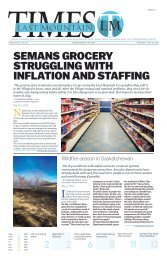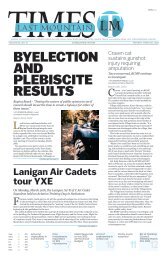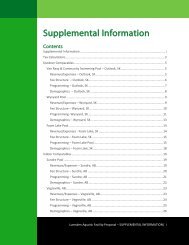LMT November 5th 2018
Create successful ePaper yourself
Turn your PDF publications into a flip-book with our unique Google optimized e-Paper software.
4 Last Mountain Times • Monday, <strong>November</strong> 5, <strong>2018</strong> • lmtimes.ca<br />
East Shore Arts and Craft Tour<br />
Sat. Nov. 17, 10 am. - 4 pm.<br />
Art stops in Duval - New School Arts<br />
Strasbourg - What If? Gallery and<br />
Bulyea Community Hall - lunch served.<br />
Ken Arndt Memorial<br />
Foundation<br />
New School Arts<br />
Silton- Strasbourg- Bulyea- Duval Recreation Boards<br />
Advanced<br />
DENTURE CLINIC<br />
Kerry Rodgers, D.D. Denturist<br />
Tel: 525-5200<br />
1-888-723-1110<br />
Fax: 525-3271<br />
Email: smile4me@sasktel.net<br />
4306 Dewdney Avenue<br />
Regina, SK S4T 1A8<br />
(Dewdney & Lewvan)<br />
00074621<br />
Get free<br />
Digital Edition at<br />
<strong>LMT</strong>IMES.CA<br />
All you can eat, including the packaging?<br />
A strong case for<br />
taste and food safety<br />
will have to be made<br />
before consumers will<br />
be willing to eat their<br />
garbage<br />
Within a year, single-use<br />
plastics and excess packaging<br />
have become public enemy No.<br />
1. Everyone is talking about how<br />
our lives are overrun by too much<br />
plastic.<br />
A recent Greenpeace-led audit<br />
looked at waterways waste and<br />
companies involved. Much of the<br />
plastic trash cleaned up from<br />
Canadian shorelines this fall<br />
was traceable to five companies:<br />
Nestlé, Tim Hortons, PepsiCo,<br />
the Coca-Cola Co. and McDonald’s.<br />
All these companies are<br />
part of the food industry, which is<br />
hardly surprising.<br />
As consumers look for convenience<br />
and more portable food<br />
solutions, this problem won’t go<br />
away. In fact, it could get worse<br />
if nothing is done. Canadians<br />
households spend roughly 35 per<br />
cent of their food budget outside<br />
a grocery store and that percentage<br />
increases every year. People<br />
walking around with plastic containers,<br />
bags, wrappers and cups<br />
will grossly increase.<br />
Demographics are also complicating<br />
things. Since more people<br />
live alone, single servings are<br />
becoming more popular. That too<br />
requires more packaging.<br />
The food service, retail and<br />
processing sectors are fully aware<br />
of this environmental conundrum.<br />
But what’s brutally unclear for<br />
companies is how to deal with it.<br />
The whole situation is made<br />
worse by the fact that plastic<br />
use has become an international<br />
political issue.<br />
In the food industry, conversation<br />
on green supply chains<br />
focuses on compostable and even<br />
edible solutions. Plenty of technologies<br />
already exist and more<br />
are being developed.<br />
In 2010, PepsiCo Canada came<br />
out with the first compostable<br />
bag for its SunChips. This package<br />
was to completely break down<br />
in a hot, active compost pile in<br />
approximately 14 weeks. Some<br />
tests concluded that it didn’t. An<br />
influential social media campaign<br />
led to the compostable SunChips<br />
bag’s downfall. The company<br />
pulled it from the market less<br />
than a year after its introduction.<br />
Since then, cities - which play<br />
a key role in completing the food<br />
product life cycle through landfill<br />
and compost services - have been<br />
more reluctant to accept anything<br />
without proper due diligence. As<br />
cities accept food packaging in<br />
green bins, retailers should promote<br />
these green solutions.<br />
So we’re now seeing an increasing<br />
number of compostable<br />
packaging on the market, which<br />
is surely a step in the right direc-<br />
CONTINUES on PAGE 7<br />
Ritz’s record tarnishes Hall of Fame<br />
Prime Minister Harper said he “would make<br />
Canada unrecognizable.” His Agriculture Minister<br />
Gerry Ritz certainly did his part to make Canadian<br />
agriculture and food unrecognizable. Minister<br />
Ritz’s destructive record speaks for itself. Does<br />
Toronto’s Royal Agricultural Winter Fair really<br />
want to damage its reputation by inducting former<br />
Agriculture Minister Gerry Ritz (2007 - 2015), into<br />
Canada’s Agriculture Hall of Fame? Consider just a<br />
small part of Minister Ritz’s destructive legacy.<br />
Under Mr. Ritz’s watch over 15% of farmers<br />
went out of business. Farmers now number a mere<br />
193,000 and our collective debt level has ballooned<br />
to over $102 billion dollars.<br />
Weighing both the costs and benefits is fundamental<br />
to successful farming and public policy, but<br />
Minister Ritz failed to do this during his tenure. He<br />
is responsible for dismantling the farmer-directed<br />
Canadian Wheat Board single desk marketing<br />
agency. He must have known the CWB had strong<br />
support since he refused to give farmers a vote. He<br />
ignored hard facts and the history of how well the<br />
CWB served farmers and Canada as whole. Destroying<br />
the CWB continues to cost farmers billions<br />
of dollars every year.<br />
Minister Ritz then took the many hard assets of<br />
the Canadian Wheat Board including thousands of<br />
grain cars, office buildings, grain ships, and a substantial<br />
amount of cash, and transferred them all<br />
to a joint venture between the Government of Saudi<br />
Arabia and the giant multinational Bunge under<br />
EDITORIALS, LETTERS & OPINIONS<br />
so-far secret terms. All of those millions of dollars<br />
of assets were paid for by farmers, yet Minister<br />
Ritz still spent millions to shut down the CWB,<br />
including tax dollars. Farmers are still in court<br />
seeking restitution for their money and assets. The<br />
tax payers of Canada may never receive a proper<br />
accounting.<br />
Almost immediately after Gerry Ritz killed the<br />
CWB, our premium customers started to complain<br />
of quality and delivery problems. Prairie wheat,<br />
which once consistently traded at a premium to US<br />
wheat, now sells for much less. Lower grain prices<br />
and poor relations with end-use buyers have become<br />
the norm because private elevator companies<br />
cannot match the CWB’s marketing sophistication.<br />
Since 2012, farmers have lost an increasing share<br />
of our grain’s value to the elevator companies. The<br />
companies are using this extra money to pay for<br />
mergers and the overbuilding of handling facilities.<br />
And, thanks to Minister Ritz the Port of Churchill<br />
and the rail line serving it was rendered uneconomic.<br />
Ottawa is now spending tax dollars to pick up the<br />
pieces.<br />
Gerry Ritz is also responsible for bringing in<br />
UPOV ’91 Intellectual Property Rights legislation,<br />
which increased the price of seed and laid the<br />
groundwork to allow multinational seed companies<br />
to charge royalties on our harvested crops.<br />
Ritz accelerated the previous government’s cuts to<br />
crop research stations and plant breeding, turning<br />
them and the rights to public research results over<br />
CONTINUES on PAGE 7

















